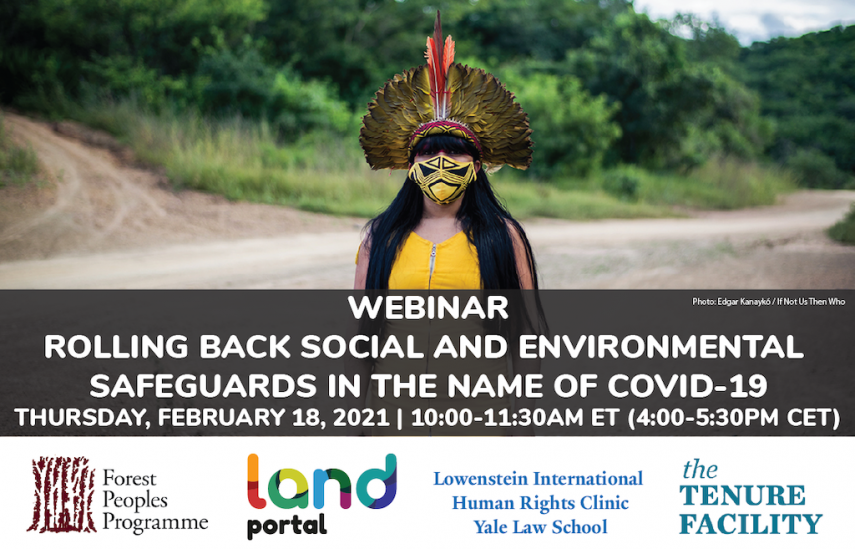MEDIA BRIEFING: Tropically Forested Countries Face Devastating Impacts as Governments Roll Back Social and Environmental Safeguards in the Name of COVID-19
MEDIA BRIEFING: FEBRUARY 18, 2021, 10:00-11:30 AM ET / 3:00 PM GMT
New Report: Tropically Forested Countries Face Devastating Impacts as Governments Roll Back Social and Environmental Safeguards in the Name of COVID-19
Economic recovery measures fuelled by boosting logging, mining and industrial agriculture are being pushed through in tropically forested countries during the pandemic at the expense of indigenous peoples and the protection of their ancestral territories – leading to violence, intimidation and impunity for forest destruction. This report calls out the reversal of policies that protect the rights of these communities.
A new study to be released on 18 February examines the impact on indigenous peoples in the world’s five most tropically forested countries, as governments move to roll back social and environmental safeguards under cover of the pandemic.
Researchers with Forest Peoples Programme (FPP), the Lowenstein International Human Rights Clinic of Yale Law School and Middlesex University London School of Law have analysed the impacts of corporate impunity and the reversal of social and environmental policies in Brazil, Colombia, the Democratic Republic of Congo, Indonesia and Peru.
The study, “Rolling back social and environmental safeguards in the time of COVID-19”, includes case studies by researchers in each country. It documents governments’ responses to land grabs and human rights violations by corporate actors, while they are simultaneously rewriting and reversing policies that indigenous leaders and their allies had fought for. Indigenous peoples play a crucial role in averting climate change, biodiversity loss and pandemic risk. They outperform other forest managers in preventing deforestation.
In the last two years, scientists have produced a significant body of evidence demonstrating that safeguarding the rights of indigenous peoples and local communities is an untapped, effective and affordable way of reducing deforestation and biodiversity loss. Most recently, a policy paper in Science cited recognition of forest peoples’ land rights as key to reducing the emergence of potentially deadly pathogens and the occurrence of future pandemics. This must be taken into account when assessing the potential impact of proposed policies in countries that import commodities from tropical regions.
WHAT: A webinar to launch the new report, “Rolling back social and environmental safeguards in the time of COVID-19: the dangers for indigenous peoples and tropical forests.
WHO:
- Bivyane Rojas, Indigenous Rights Lawyer with the Socio-Environmental Institute of Brazil
- Ricardo Camilo Niño Izquierdo, Technical Secretary of the Indigenous Secretariat of the National Commission for Indigenous Territories of Colombia
- Wrays Perez, President of the Territorial Government of the Autonomous Wampis Nation in Peru
- Rukka Sombolinggi, Secretary General of the Indigenous Peoples Alliance of the Archipelago (AMAN) in Indonesia
- Cathal Doyle, Co-author and Senior Lecturer at the Middlesex University London School of Law
- Moderator: Jonathan Watts, Global Environment Editor, The Guardian
WHEN & WHERE: February 18, 2021, at 10:00 a.m. Eastern//3:00 p.m. London//4:00 p.m. Paris //10:00pm Jakarta. The webinar will be conducted in English and Spanish.
INSTRUCTIONS FOR JOINING:
RSVP to wbautista@burness.com or +1.302.233.5438 (Washington, D.C.) to receive the registration link.
To ask questions of the speakers:
- In advance: Please send questions to wbautista@burness.com.
During the zoom call: Please submit questions through the chat function, and include your name and outlet.



